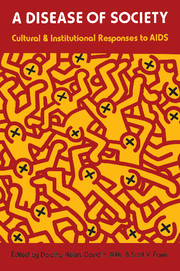Book contents
- Frontmatter
- Contents
- Acknowledgments
- Introduction: A Disease of Society: Cultural and Institutional Responses to AIDS
- PART I CULTURAL IMAGES
- PART II SYSTEMS OF SOCIALIZATION AND CONTROL
- PART III SYSTEMS OF CARING
- The Culture of Caring: AIDS and the Nursing Profession
- AIDS and its Impact on Medical Work: The Culture and Politics of the Shop Floor
- AIDS Volunteering: Links to the Past and Future Prospects
- PART IV RIGHTS AND RECIPROCITIES
- Notes on Contributors
- Index
The Culture of Caring: AIDS and the Nursing Profession
Published online by Cambridge University Press: 20 May 2010
- Frontmatter
- Contents
- Acknowledgments
- Introduction: A Disease of Society: Cultural and Institutional Responses to AIDS
- PART I CULTURAL IMAGES
- PART II SYSTEMS OF SOCIALIZATION AND CONTROL
- PART III SYSTEMS OF CARING
- The Culture of Caring: AIDS and the Nursing Profession
- AIDS and its Impact on Medical Work: The Culture and Politics of the Shop Floor
- AIDS Volunteering: Links to the Past and Future Prospects
- PART IV RIGHTS AND RECIPROCITIES
- Notes on Contributors
- Index
Summary
Caring is nursing and nursing is caring
(Leininger 1984, 83).Nurses provide care for people in the midst of health, pain, loss, fear, disfigurement, death, grieving, challenge, growth, birth, and transition on an intimate front-line basis. Expert nurses call this the privileged place of nursing [emphasis added]
(Benner and Wrubel 1989, xi).Nursing has always been a much conflicted metaphor in our culture, reflecting all the ambivalence we give to the meaning of womanhood. Perhaps in the future it can give this metaphor, and ultimately caring, new value in all our lives
(Reverby 1987, 207).The nurses who speak through these quotations all agree that caring is, and always has been, the cornerstone and the quintessence of their profession. It is the key concept of nursing, the vital theme around which the whole field turns. Coded into the notion of caring are the characteristic forms of knowledge and skill, practice, and ritual, the fundamental attitudes and values, beliefs and symbols that define the work that nurses do, its goals, its meaning, and its distinctive culture.
Over time, the world in which nurses work has undergone fundamental alterations that have diminished the paramountcy of caring, making it more difficult to sustain on a consistent and continuing basis. Changes in illness patterns, the increasing dominance of technology in medical care, the growth of bureaucratic medicine, and the preoccupation with cost containment in recent years all act to constrain and thwart nurses from meeting what they regard as their foremost and unique obligation to patients.
- Type
- Chapter
- Information
- A Disease of SocietyCultural and Institutional Responses to AIDS, pp. 119 - 149Publisher: Cambridge University PressPrint publication year: 1991
- 1
- Cited by



